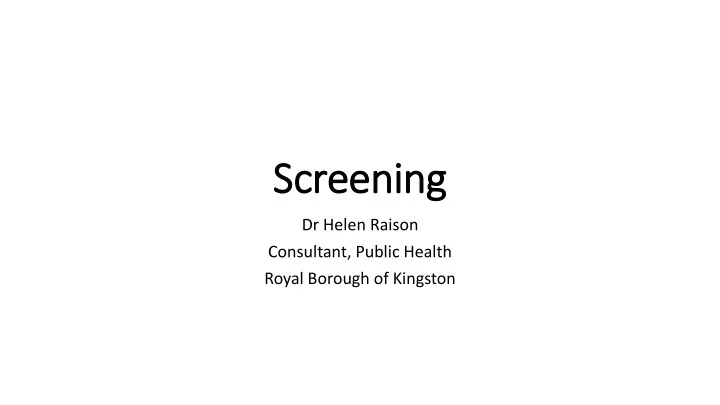

Screening Dr Helen Raison Consultant, Public Health Royal Borough of Kingston
What is screening? Screening is a process of identifying apparently healthy people who may be at increased risk of a disease or condition. They can then be offered information, further tests and appropriate treatment to reduce their risk and/or any complications arising from the disease or condition.
UK Population Screening Programmes Antenatal and Newborn Young Person and Adult • sickle cell and thalassaemia • diabetic eye • fetal anomaly • abdominal aortic aneurysm • infectious diseases in • breast cancer pregnancy • cervical cancer • newborn and infant physical • bowel cancer examination • newborn blood spot • newborn hearing Have to meet strict criteria to be introduced as a managed screening programme by National Screening Committee
Antenatal And Newborn Screening Programmes
Adult Screening Programmes
Adult Screening Programmes
Diabetic Retinopathy Screening Programme • Diabetes can lead to diabetic eye disease. • Early identification and treatment of diabetic eye disease can reduce sight loss. • The main treatment for diabetic retinopathy is laser surgery. • All people with known type 1 and type 2 diabetes aged 12 or over are invited for screening • People already under the care of an ophthalmology specialist for the condition are not invited for screening. • The programme offers pregnant women with type 1 or type 2 diabetes additional tests because of the risk of developing retinopathy • 79.4% of those offered a test attended and had digital screening
Abdominal Aortic Aneurysm Screening Programme • https://www.gov.uk/guidance/abdominal-aortic-aneurysm-screening- programme-overview
Breast Cancer Screening Programme • Women age 50-70 automatically invited every 3 years • Some older and younger women are invited as part of a screening study • Women over 70 can continue to have breast screening every 3 years but have to request it • Finds small cancers which cannot yet be seen or felt • Main risk is that some women will be diagnosed and treated for a breast cancer that would never otherwise have been found or caused them harm • 66.2% eligible women screened in last 3 years in South West London. Lower than target of 70% coverage • Screening leaflets https://www.gov.uk/government/collections/ breast-screening-information-leaflets.
Bowel Cancer Screening Programme • Offered every 2 years to all men and women aged 60 to 74 • Information letter sent, followed by posted faecal occult blood sampling kit. The kit includes simple instructions for taking sample at home and sending to lab • The sample is then processed and the results sent to the individual within 2 weeks. • Colonoscopy for those with abnormal screening result (to look at bowel lining) • 53.9% eligible people been screened in past 2.5 years in SWL. Working to increase this. • A bowel scope screening programme is being introduced for all men and women in England aged 55
Cervical Cancer Screening Programme • https://www.gov.uk/guidance/cervical-screening-programme- overview
Why some screening tests are not run as screening programmes? • National Screening Committee makes recommendations on 109 conditions • Reviews every 3 years • Uses evidence to decide if population screening should be introduced, changed or stopped • Examples of conditions where NSC has recommended ‘no’ in 2017 include: • Asymptomatic bacteriuria • Antenatal carriage of Group B streptococcus • Ovarian Cancer • Duchenne Muscular Dystrophy
Prostate Cancer – PSA screening test • Second leading cause of cancer-related death in UK men • Risk of prostate cancer increases with age, family history, in black men, in overweight and obese men • NSC does not recommend universal screening (2016) • Slow growing prostate cancer is common, may not cause symptoms or shorten life • Abnormal PSA test may mean a man has cancer, but it may mean he does not (3 in 4 men wont) • PSA test cannot distinguish fast-growing from slow-growing cancers • Prostate cancer screening can reduce prostate cancer deaths by 21% but it can also lead to major harms caused by treating men who incorrectly testing positive. NSC concluded that harms outweigh the benefits. • Work is ongoing to increase the accuracy of the PSA test • Information on PSA test: https://patient.info/health/prostate-and-urethra- problems/prostate-specific-antigen-test-psa • NHS/PHE Prostate Cancer Risk Management Programme – guidance for GPs and patients to decide whether to do a PSA test
Who is who in screening ? UK National Screening Committee advises ministers and the NHS in the 4 UK countries about all aspects of screening and supports implementation of screening programmes PHE Screening and NHSE England PHE lead the national population screening programmes, and advise NHSE NHS, GPs, Hospitals Royal Borough Kingston Public Screening Commissioners who deliver the screening programmes Health Team assures local commission the programmes at screening centres, maternity programmes, holds PHE/NHSE units, GP surgeries, local clinics to account, supports work to reduce inequalities in access to screening Helen Raison, Screening Assurance Lead
Recommend
More recommend